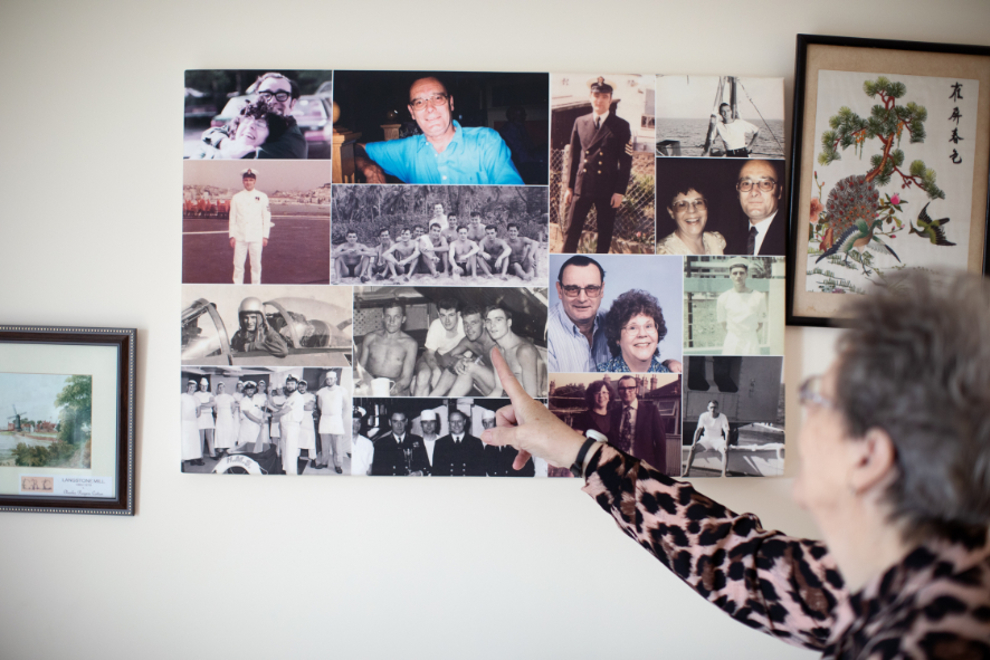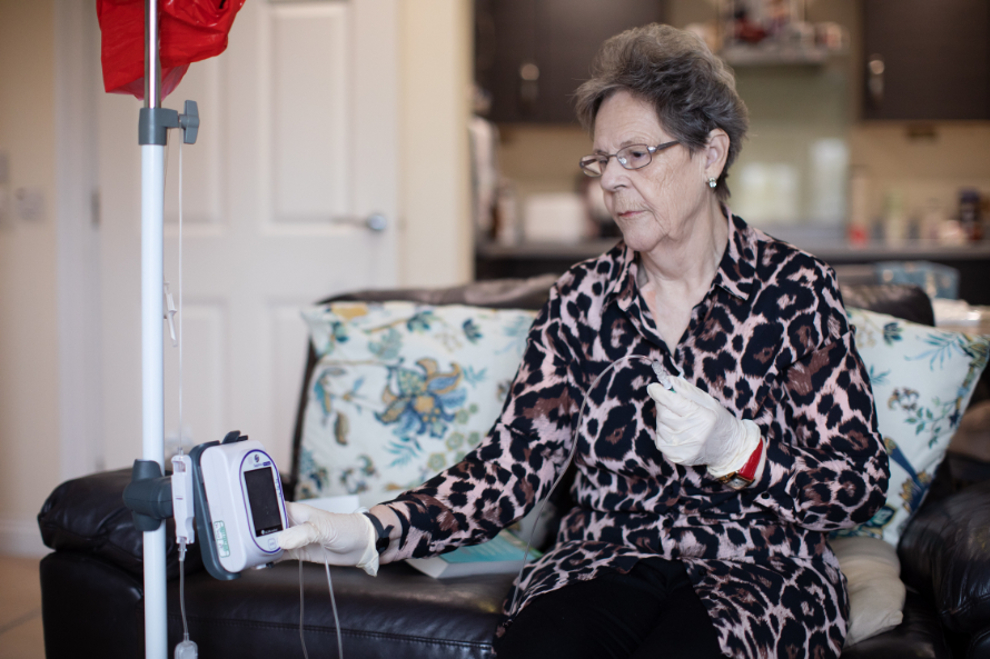For most Blesma Members, their disability is visible – bringing with it both positive and negative attention. For others, however, a ‘hidden disability’ creates a whole different set of issues.
Bonnie Harrison, 79, knows that more than anyone. After developing cervical cancer when she was just 34 years old, she was treated with radiotherapy which resulted in severe intestinal issues. She has had to live her life ever since managing the condition, and it’s not been easy.
“Hidden disability can be very frustrating, and people often don’t understand what you are going through,” says Bonnie. “I have to be careful what I eat, I need to be close to a toilet, and sometimes I decline food, which people might take as being rude. Things like going on holiday, for example, take a lot of preparation. So I do think it is important to accommodate and care for people in these situations – although I also think of myself as very lucky.”
Bonnie (her real name is Yvonne, but her baby brother pronounced it ‘Bonnie’, and she’s been called that ever since) is a Blesma Widow. She grew up in coastal Hampshire, the daughter of a Navy man, and married a sailor herself. “I was 19 and engaged to someone else when I met Sam at a party,” she says.
“He was so lovely that I broke off my engagement and we were married 10 months later, in 1963, because he was going off to sea. “Sam was always full of fun, and when he died I said he was 73 going on 10! We had two daughters, and when I got unwell with cancer, Sam left the Navy and came home. He became a postman, which he loved, and we made a home for ourselves in Havant.”
Bonnie’s diagnosis was a shock, however. “I had no symptoms,” she remembers. “I used to go to a birth control clinic because I was on the pill. I went for my annual smear test, and they sent me to a gynaecologist in Portsmouth. I had a biopsy and they discovered the cancer. I had eight weeks of radiotherapy. Thank goodness I’d already had my kids because the treatment can leave you unable to have children.” It was a traumatic time for all the family.
“All I wanted to do in life, like any mother, was to survive to bring up my daughters, to tell them all the things they needed to know,” says Bonnie. “And we did get through it. The radiotherapy saved me, and I’ll always be grateful for that, but it also caused problems.”
THE RESULTS OF RADIOTHERAPY
Radiotherapy was a different business in the 1970s and had more severe side effects than the modern treatment. “I wouldn’t want to put anyone off having that treatment now because today it is much better,” says Bonnie, “but it gave me bowel issues right away. And that got worse over the years. I went back to college and ended up working at the council doing the payroll. But my condition got really bad, and I was surviving on Rich Tea biscuits and jellies just to get me through the day. “It worsened still before I retired at the age of 61. By 2002, things were terrible. In the end I went back into hospital, and the doctors discovered that my condition had seriously deteriorated.”
Bonnie battled on, looking after her children, and eventually Sam as well when he lost his leg due to vascular problems. “He was diabetic and a heavy smoker, and in 2008 he had an amputation above the knee,” she says. The pair were soon involved in Blesma. “We saw a magazine at the prosthetic centre and Sam got in touch with the Support Officer, Bill Gillett,” says Bonnie. “He visited and got us a lightweight wheelchair because I was having difficulty lifting our heavy one into the car. He also got some bath seats for Sam. Then we started going to the Portsmouth Branch for their lunches and meetings. It was a lot of fun. Sam loved it, and I became a Welfare Officer, staying in touch with the Blesma Widows.” But Bonnie’s health struggles continued.


HIDDEN DISABILITY
“Eight years ago, I had a colectomy, which involves removing a lot of your bowel. I was in hospital for four months, but that didn’t work. Eventually, I had an ileostomy where the small intestine is diverted through an opening in your tummy. At the same time, the doctors discovered that I wasn’t absorbing any goodness from my food, so I went on something called total parental nutrition, or TPN.
“This puts the nutrition you need right into the central vein in your shoulder. It takes 10 hours, so I do it overnight and am asleep for most of it. I have three nights of feed and three nights of saline because I also lose fluids and dehydrate easily. I feel OK most of the time. I go to a clinic every six months and have blood tests every three, and the nutrition team are brilliant.”
Hidden disability can be very frustrating. People don't understand what you are going through.
Blesma Widow, Bonnie
KEEPING A POSITIVE OUTLOOK
Despite everything she has been through, Bonnie feels fortunate: in previous decades, people with her medical condition were confined to hospital for life. Now she can hook herself up to the drips at night and go about her everyday business during the day. “For a while, nurses would come and connect and disconnect me, but then they taught me how to do it myself,” she says. “It’s amazing what can be done with nutrition these days, and I can eat and enjoy some regular foods, although I need to be careful. If I go anywhere, I need to make sure they have a fridge for my feed, and I need to take lots of stuff, including dressings,” she says. “But I’ve found that Blesma is great for me – the Association always manages, there is always someone to help with a car, I guess Blesma is used to everything! “But it has made me very aware of hidden disability.
There are children with the same issue as me who go to school with a feed backpack and sit and do lessons. Other people can’t eat or drink at all.” Bonnie still enjoys a busy social life, with Blesma at its heart. “After Sam passed away, I went to Widows and Seniors Weeks,” she says. “I love them, along with the Members’ Weekend. I love the service of remembrance, and I like to listen to the AGM. The evening meal is wonderful – at the last one, my friend and I did a conga around the room! “I’ve made some very good friends through Blesma. I met one lady, Vera, on my first Widows Week. She’s 94, and I ring her every week, which she loves because she doesn’t go out much.
She has come to stay with me and I always keep in touch.” Most of all, Bonnie is all about looking on the bright side of life. “I keep a positive attitude,” she says. “I have a home, I’m warm, I enjoy reading and knitting, I have my daughters and grandchildren nearby, and lovely neighbours in my flat. I compile family histories, and even though the Portsmouth Branch is closed, I still contact the same Widows, and it is always nice to talk. I can report back if anyone has a problem, too.”

We can help
We are dedicated to assisting serving and ex-Service men and women who have suffered life-changing limb loss or the use of a limb, an eye or sight. We support these men and women in their communities throughout the UK. Click the link below to find out the different kinds of support we offer.
Get Support
Leave a comment
Join fellow Members and supporters to exchange information, advice and tips. Before commenting please read our terms of use for commenting on articles.